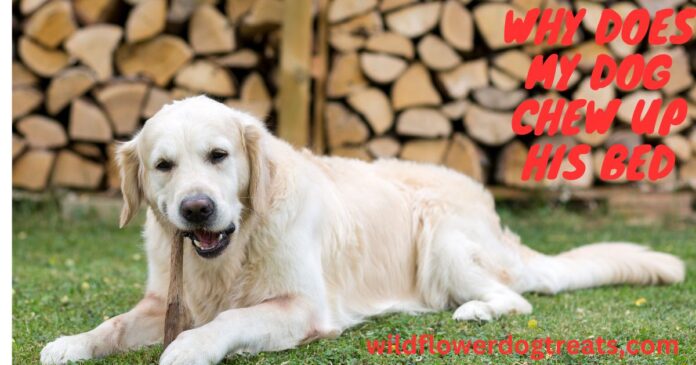Dogs chew their beds due to boredom, anxiety, or teething issues. Ensuring mental and physical stimulation can alleviate this behavior.
Dog owners often find themselves frustrated when their beloved pet chews up their bed. This common issue can stem from various reasons such as boredom, separation anxiety, or teething problems in puppies. Understanding the underlying cause of this behavior is crucial in addressing it effectively.
Providing appropriate mental and physical stimulation, alongside using durable chew-proof bedding, can help discourage this destructive habit. Furthermore, seeking professional advice from a veterinarian or dog behaviorist may be necessary to tackle severe cases of destructive chewing. Ultimately, with the right approach and attention, pet owners can prevent their dogs from destroying their beds and create a safe, comfortable environment for their furry companions.
Understanding Destructive Chewing In Dogs
Dogs are known for their enthusiastic chewing tendencies, and while it may seem harmless, destructive chewing can be a cause of concern for many pet owners. Understanding the root causes behind this behavior can help mitigate the issue and provide a solution suitable for your furry friend’s needs.
Types Of Chewers
It’s essential to understand that dogs may engage in destructive chewing for various reasons, and categorizing them into different types of chewers can aid in addressing this behavior effectively. Some dogs chew due to teething, while others may exhibit compulsive chewing habits. Recognizing these differences is crucial in managing destructive chewing efficiently.
Common Reasons For Destructive Chewing
Destructive chewing in dogs can often be attributed to a range of reasons, such as boredom, lack of exercise, or separation anxiety. Identifying these common triggers can help pet owners address the root cause of their dog’s destructive chewing and take appropriate measures to alleviate the behavior.
Obsessive Compulsive Behavior In Dogs
For some dogs, destructive chewing may stem from obsessive-compulsive behavior. They may continuously gnaw on objects or surfaces, causing damage to their surroundings. Understanding the underlying compulsive tendencies in these dogs is imperative for devising a suitable intervention plan to manage their behavior.
Recognizing Anxiety-driven Destructive Chewing
Anxiety is a common cause of destructive chewing in dogs, especially when they experience separation anxiety or when faced with stressful situations. Recognizing the signs of anxiety-driven chewing, such as panting, pacing, and restlessness, can help pet owners take proactive steps to alleviate their dog’s distress and minimize destructive chewing behaviors.
The Role Of Teething And Boredom
Teething and boredom are also significant factors contributing to destructive chewing in dogs. Understanding the developmental phase of teething and providing appropriate chew toys can help redirect their chewing behavior. Additionally, ensuring mental and physical stimulation can prevent dogs from resorting to destructive chewing out of boredom.
Identifying Bed-chewing Behavior In Dogs
Signs Your Dog Is Chewing His Bed
Chewing and ripping their beds is a common behavior seen in some dogs. The signs of bed-chewing behavior include finding torn fabric, foam, or filling strewn throughout the house. You may also notice frayed edges or holes in the bedding material. Frequent replacement of bedding due to damage can be another telltale sign. If you observe any of these signs, your dog may be exhibiting bed-chewing behavior.
Differentiating Between Regular And Destructive Chewing
It’s important to distinguish between normal and destructive bed-chewing. While it’s natural for dogs to explore and manipulate objects with their mouths, destructive chewing typically occurs when the dog is left alone, showing signs of distress or anxiety. Regular chewing might happen during play or rest, but destructive chewing is often targeted toward the dog’s bedding. Understanding the difference is vital in addressing the behavior effectively.
Behavioral Triggers For Bed-chewing
Anxiety, boredom, fear, or frustration can often lead dogs to engage in bed-chewing. If they’re not getting enough physical and mental stimulation, dogs may resort to destructive behaviors such as chewing. Recent changes or disruptions in their routine, environment, or lack of proper training can also contribute to this behavior. Identifying and addressing the triggers can help prevent future bed-chewing incidents.
Examining The Impact Of Breed And Age
Breed and age can influence a dog’s behavior, including bed-chewing tendencies. Puppies and adolescent dogs may chew to relieve discomfort from teething or out of curiosity. Certain breeds are also predisposed to chewing behaviors, such as retrievers. Understanding breed-specific traits and providing suitable outlets for chewing can help minimize damage to bedding.
Addressing Underlying Causes Of Destructive Chewing
Destructive chewing in dogs, such as chewing up their bed, can be a frustrating behavior for pet owners. While providing a comfortable and durable bed for your pup is important, it’s also crucial to address the underlying causes of this behavior to prevent it from continuing. By understanding and addressing these root causes, pet owners can help their furry friends develop healthier habits and create a more harmonious living environment.
Providing Sufficient Physical And Mental Stimulation
Dogs often resort to destructive chewing when they are bored or have excess energy. To prevent this behavior, make sure your dog receives sufficient physical exercise through regular walks, playtime, and interactive activities. Additionally, mental stimulation is equally important. Consider puzzle toys, obedience training, and even scent games to engage your dog’s mind and prevent boredom.
The Importance Of A Consistent Routine
Consistency is key in shaping your dog’s behavior. Establish a regular schedule for feeding, exercise, playtime, and rest. Dogs thrive on routine, so providing a predictable daily structure can help reduce anxiety and prevent destructive behaviors like chewing up their bed.
Using Positive Reinforcement Training Techniques
Utilize positive reinforcement methods to encourage good behavior. Reward your dog with treats, praise, and affection when they demonstrate appropriate chewing behavior. This will help them understand what is expected of them and reinforce positive habits.
Creating A Safe And Comfortable Environment For Your Dog
Ensure your dog has a comfortable and safe space where they can relax and feel secure. Provide suitable chew toys and a comfortable bed, and limit access to potential hazards that may tempt destructive chewing.
Implementing Effective Stress-relief Strategies
Dogs may resort to destructive chewing as a way to cope with underlying stress or anxiety. Implement stress-relief strategies such as calming pheromone diffusers, soothing music, and comforting routines to help your dog feel more at ease and reduce the urge to engage in destructive chewing behavior.
Practical Solutions To Stop Bed-chewing
Bed-chewing behavior in dogs can be a frustrating challenge for pet owners, but with the right strategies, it’s possible to curb this habit and create a more peaceful living environment for both you and your furry friend. By implementing practical solutions and utilizing effective tools, you can address the root causes of bed-chewing and redirect your dog’s energy in a positive way. Let’s explore some actionable approaches to put an end to bed-chewing once and for all.
Choosing Dog Beds Designed For Chewers
When selecting a dog bed, opt for chew-resistant and durable materials that can withstand your dog’s chewing tendencies. Look for beds specifically designed for chewers and made from heavy-duty fabrics or reinforced stitching to deter destructive behavior.
Utilizing Chew Toys And Distracting Alternatives
Provide your dog with an array of chew toys and interactive alternatives to redirect their focus away from the bed. Introduce puzzle feeders or treat-dispensing toys to keep them mentally stimulated and prevent boredom-induced chewing.
Incorporating Bitter Apple Spray And Anti-chew Products
Utilize bitter apple spray or anti-chew deterrents on the edges and corners of the bed to make it less appealing for chewing. These products emit a unpleasant taste or odor that discourages dogs from chewing on the designated surface.
Establishing Boundaries And Using Crating Techniques
Set clear boundaries and encourage positive chewing behaviors by utilizing crating techniques. Provide a secure and cozy crate equipped with appropriate chew toys to create a safe space for your dog to rest and relax without the temptation to chew on their bed.
Enhancing Obedience Training To Redirect Chewing Behaviors
Enhance the effectiveness of obedience training by redirecting your dog’s chewing behaviors towards acceptable outlets. Use positive reinforcement and reward good behavior to encourage your dog to chew on designated toys and objects instead of their bed.
Implementing these practical solutions can help you address bed-chewing behavior in your dog and create a harmonious living environment for both you and your furry companion.
Long-term Behavior Modification And Management
Long-term behavior modification and management are essential in addressing the underlying reasons behind your dog’s destructive chewing behavior. By implementing effective strategies and seeking professional guidance, you can help your dog develop positive habits and reduce the tendency to chew up their bed.
Seeking Professional Help From Veterinarians Or Behaviorists
If your dog consistently chews up their bed despite your efforts, consulting a veterinarian or certified animal behaviorist is crucial. They can conduct a thorough assessment to identify any underlying health issues or behavioral problems that may be contributing to this behavior. Professional guidance can provide valuable insights and tailored strategies to address your dog’s specific needs.
The Effectiveness Of Medication In Severe Cases
In severe cases where the chewing behavior is linked to anxiety or other underlying issues, medication may be prescribed by a veterinarian. This can help alleviate your dog’s distress and reduce the urge to engage in destructive chewing. However, medication should always be used in conjunction with behavior modification techniques for long-term success.
Monitoring And Adjusting For Progress And Reoccurrence
Consistent monitoring of your dog’s behavior is vital to track their progress in overcoming destructive chewing habits. By observing any reoccurrence of the behavior, you can make necessary adjustments to the management and modification techniques. This proactive approach allows you to address any setbacks promptly and refine your strategies for better results.
Tips For Consistently Reinforcing Positive Behavior
Consistency is key in reinforcing positive behavior in your dog. Implementing a rewards-based training approach, using positive reinforcement and praise, can encourage your dog to engage in desirable behaviors. Creating a structured environment and providing engaging toys can also redirect their chewing tendencies towards appropriate outlets.
Recognizing The Role Of Patience And Persistence
Changing your dog’s behavior requires patience and persistence. It’s essential to understand that behavior modification is a gradual process, and results may not be immediate. As a pet owner, maintaining a positive and supportive attitude while consistently applying the recommended techniques can significantly contribute to long-term success.

Frequently Asked Questions On Why Does My Dog Chew Up His Bed
Why Does My Dog Chew Up His Bed?
Dogs may chew their bed due to stress, anxiety, or boredom. Providing plenty of exercise and mental stimulation can help reduce this behavior. It’s also essential to ensure that your dog has a comfortable, durable bed that is suitable for their size and breed.
How Can I Stop My Dog From Chewing His Bed?
To prevent bed chewing, provide appropriate chew toys, supervise your dog, and redirect their attention when they start chewing. Consider using deterrent sprays or bitter apple on the bed. Increasing physical and mental exercise can also help relieve stress and boredom, reducing the urge to chew.
Is Bed Chewing A Sign Of A Health Issue In Dogs?
In some cases, excessive chewing may indicate dental problems, allergies, or separation anxiety. If your dog continues to chew despite behavior modifications, it’s essential to consult a veterinarian. They can rule out any underlying health issues and provide guidance on managing the behavior effectively.
What Type Of Bed Is Best For A Dog That Chews?
For dogs that are prone to chewing, it’s important to choose a durable and chew-resistant bed. Consider options such as elevated cots, indestructible beds, or heavy-duty canvas beds. Avoid beds with soft fillings or easily destructible materials. Providing a designated chew toy can also redirect their chewing behavior away from the bed.
Conclusion
Understanding why your dog chews up his bed is crucial for his well-being. By addressing any underlying issues, such as anxiety or boredom, you can help prevent this behavior. Providing appropriate chew toys and engaging in regular exercise can also redirect your dog’s attention.
Remember, patience and consistency are key in addressing this common problem.



